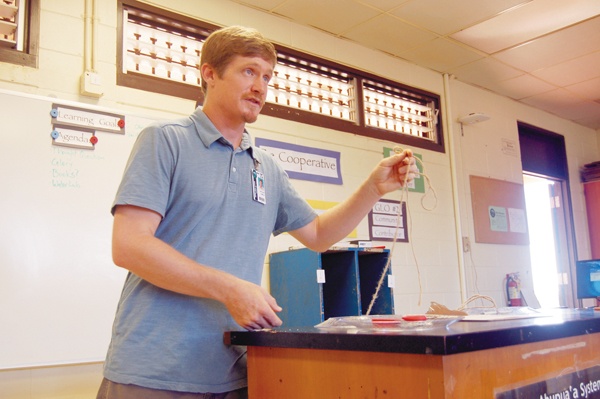When Matthew O’Reilly moved to Hawaii in the summer of 1999, he had aspirations of becoming involved in the organic agriculture industry. And for the last decade, that is exactly what he did at Kailani Farms in Kilauea, where he
When Matthew O’Reilly moved to Hawaii in the summer of 1999, he had aspirations of becoming involved in the organic agriculture industry.
And for the last decade, that is exactly what he did at Kailani Farms in Kilauea, where he routinely trained new workers or gave educational tours preschool and high school students visiting the farm.
But there was something, O’Reilly said, that convinced him to enroll in the University of Hawaii at Manoa’s education program about three years ago.
“It was a thing where teaching was a unique part of my personality, but I couldn’t really avoid it,” the 35-year-old Kapaa resident said. “Wherever I was or whatever I was doing, I was teaching in one form or another.”
Earlier this year, O’Reilly left his job at Kailani Farms to fulfill his mandatory unpaid student teaching requirements at Kilauea Elementary School during his last semester in the teaching program.
There was, however, one problem.
In addition to teaching for at least five days out of the weeks, UH requirements prohibited O’Reilly from working another job, leaving the money earned from his wife’s part-time job as the only financial support for them and their 20-month-old son.
That’s where Growing Our Own Teachers on Kauai, a Princeville-based nonprofit, stepped in and awarded him $4,000 in financial assistance for that last semester of student teaching.
“The reality is that without that, getting my degree would have been nearly impossible,” O’Reilly said.
Kani Blackwell, founder of Growing Our Own Teachers on Kauai and a recently retired UH Manoa College of Education faculty member, said a lot has changed since she headed a program in 2003 that allows neighbor island students to earn their bachelor’s degree and teaching credentials without leaving their respective islands.
What hasn’t changed is the need to support teacher candidates during their last semester in school, Blackwell said.
It is a cause that, she said, will help keep local teachers in Hawaii and reduce the need for state education officials to recruit, hire and offer incentives for Mainland candidates, who may not stay long.
“They see our islands differently,” said Growing Our Own Teachers on Kauai President George Corrigan. “It’s not that they don’t teach, but they can’t connect to our cultural, personal level that our local teachers would be able to.”
There have been a few cases where Blackwell said she saw newly recruited Mainland teachers arrive at the start of school in August and leave a few months later.
“I get really irate when I hear about having to recruit teachers from the Mainland and giving stipends because they truly do not stay,” Blackwell said. “I’m so upset that we don’t invest more into the people who live here, work here and have a commitment to our keiki. But what I can tell you is that Kauai does. We are truly growing our own teachers.”
Since initial efforts began with the Rotary Club of Hanalei Bay in 2007, even before the organization was officially formed in 2008, volunteers and board members have raised and given at least $208,000 to 52 student teachers during their last semester of college.
Blackwell said the $4,000 assistance is especially helpful, because teachers can spend the money at their own discretion for anything they may need during that last semester, such as textbooks, rent payments, groceries, or airfare to Oahu.
And the dividends from those investments, she said, are beginning to pay out.
Of those students who have received assistance, Blackwell said she is aware of one who got married and moved off the island. The rest of those teachers, she said, are still in local classrooms.
“It’s exciting to see our teachers excel and now they’re mentoring other teacher candidates from UH,” Blackwell said. “It’s just a cycle of an ongoing process — we helped you, now you help others. It has kind of become the motto of Growing Our Own Teachers.”
O’Reilly, who teaches physical science and biology to ninth-grade students at Kapaa High School, is happy he has finally found his calling.
“Any teacher will tell you that it’s a lot of work but any job is a lot of work, especially when you want to do it well,” O’Reilly said on Wednesday morning in between classes. “It’s a lot like a science experiment, where you’re reflecting on what works and what didn’t work, but I am really happy that this is where I went.”
To receive financial assistance, prospective teacher candidates must be eligible to begin their field practicum through UH Manoa’s College of Education and commit to stay on Kauai and teach at a local school for at least three years.
For more information, visit the Growing Our Own Teachers on Kauai website at www.growkauaiteachers.org or call 826-6988.
• Darin Moriki, staff writer and photographer, can be reached at 245-3681 or dmoriki@thegardenisland.com.


